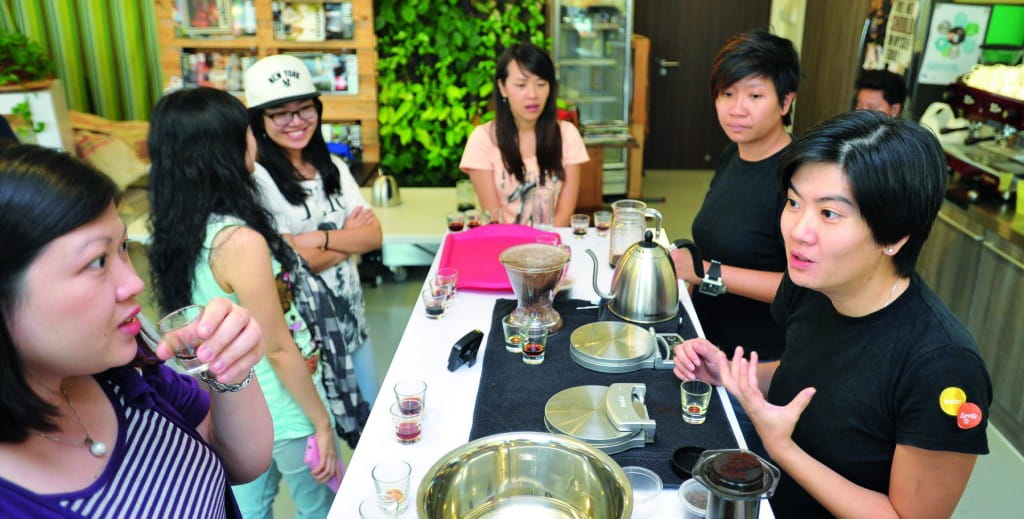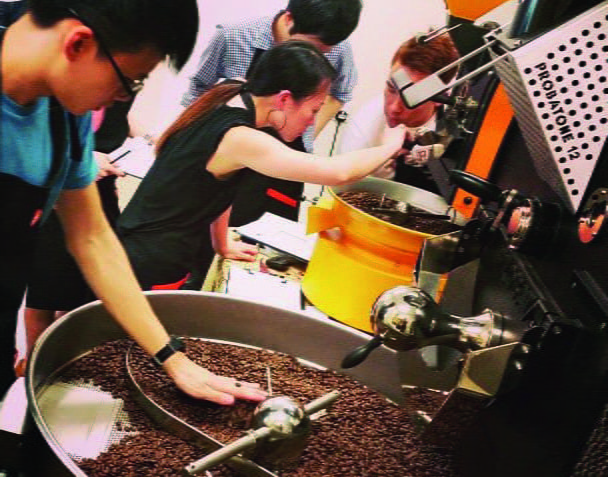
Making the world a better place, one barista at a time. Bettr Barista Coffee Academy is social entrepreneur Pamela Chng’s answer to address the shortage of coffee professionals in Singapore while empowering disadvantaged women and youth-at-risk with the skills and tools to become world-class baristas.
By Eric Alagan
Each trainee gently inhales the aroma of freshly brewed coffee and passes around the cups. They are cultivating their sense of smell and taste for java using a technique called cupping.
“Just like wine tasting, coffee tasting requires a full play of our senses to detect acidity, body, aroma and flavour,” says Pamela Chng, 37, founder of Bettr Barista. Her full-fledged coffee academy provides training for baristas and roasters.
In addition to coffee aficionados wanting to perfect the art of making that better tasting cup of coffee, Bettr Barista also offers an opportunity to those who want to make better lives. Bettr Barista is a social enterprise that reaches out to women and youth-at-risk referred by social service organisations such as the Lakeside Family Service Centre and the Malay Youth Literary Association. The women come from broken marriages, abusive relationships and single-parent households while the youth, aged 17 to 25, are mostly school dropouts from underprivileged families.
Bettr Barista’s trainees pay only $300 instead of the usual $3,500 for the 12-week programme, which includes four weeks of barista training and an eight-week internship. They receive a stipend during their internship and use some of this money to pay for their course fee. Upon graduation, these coffee professionals join speciality coffee outlets throughout Singapore.
Bettr Barista makes up for the shortfall from its core business, which includes training members of the public to become coffee professionals, conducting coffee appreciation classes, and selling coffee products and equipment.
WELL-PERCOLATED VISION
“My vision for Bettr Barista is to be the best in Southeast Asia. To produce the finest coffee professionals and to ensure that high standards are maintained,” says Chng, a certified barista herself, who secured accreditation from the speciality coffee associations of Europe and America.
“My vision for Bettr Barista is to be the best in Southeast Asia. To produce the finest coffee professionals and to ensure high standards are maintained.”
— Pamela Chng
Her vision started percolating 15 years ago, over thousands of cups of coffee, and travelling through several countries. Deep reflection led her to want to be “the best versions of ourselves” and “to empower those who have less than us”.
In November 2011, Chng, a self-confessed caffeine junkie, married her love of fine coffee with her desire to help the disadvantaged. She divested her stake in Digital Boomerang, a web consultancy she co-founded eight years before that, and launched Bettr Barista.

Founder of Bettr Barista, Pamela Chng (extreme right) teaching the finer points of coffee brewing at a training session.
TRAINING THE UNEMPLOYABLE
Since its inception, Bettr Barista has trained 30 unemployable youth and women while positively benefitting over 80 dependants.
The academy takes in trainees with low or no academic achievements, hobbled by emotional issues and considered “unemployable” by mainstream businesses. “There is much more we can do and many more women and youth who need help,” says Chng, “Graduates of our barista course command a starting salary of $1,300. After two years, they can make up to $2,000 per month.”
“We need to return to basics to equip them with emotional skills and self-confidence.
Bettr Barista takes a holistic approach to their barista training —
the core curriculum includes experiential learning about coffee, emotional development, physical and confidence training.
“The physical activities, such as outrigger canoeing and Kapap self-defence training (an adaptation of the personal self protection system originally developed for the Israeli Special Forces in the 1940s) help to build up their strength, endurance and discipline,” says Chng. “These are important especially in the Food and Beverage sector where work can be physically demanding. These skills also teach teamwork.”
However, Chng feels the number of women who enrol in their programmes could be higher. The problem is partly due to the inherent issues faced by her target group.
“For example, women with children need better access to affordable childcare and an extended support network which would help them balance the demands of family and the time required for training for a full-time job.”
Some of the youths lack self-confidence. Aina (not her real name), for example, a 19-year-old school dropout, suffers from low self-esteem, which presents an obstacle to her learning a new skill and makes her think that getting a job is impossible.
“She did not believe in herself, but I saw glimpses of steely resolve in her. She needed someone to trust in her, to give her a chance to have something to pull herself up with, even if it was only a thread,” Chng says.
Aina enrolled in the programme and, according to Chng, can now handle any task given to her with much more confidence and = self-assurance.
“What we achieve here takes a lot of emotional energy but also invigorates us.”
HEARTFELT RETURNS
“When I managed my web consultancy firm, I sat glued to the computer screen for 12 hours a day,” says Chng. “Now, I’m always on my feet, attending to so many new challenges. It’s more sensory.
“Although Bettr Barista is a social enterprise, we share similarities with other businesses, building brand and people, and fulfilling brand promises.”
Setting up Bettr Barista required a huge financial adjustment. “I took a substantial pay cut.” But she quickly adds, “In return, I receive so much more, and in particular, the deep satisfaction of helping fellow human beings.”
Chng relies on a team of 15 full-time staff and part-timers who help with all aspects of training, marketing, programme management, order delivery and even housekeeping.
“(Bettr Barista’s graduates) want to give back, help those who, like them, need the same encouragement and support they were given.”
— Pamela Chng

Trainees learning about coffee roasting and what makes an aromatic cuppa.
Many of Bettr Barista’s graduates return to help subsequent batches. “They want to give back, help those who, like them, need the same encouragement and support they were given,” says Chng. “They coach the trainees, help reach out to social service organisations and share their stories with potential students.”
The academy also hosts events where volunteers impart computer- and business-related skills to trainees and alumni.
FORWARD PLANS
Bettr Barista has attained the Approved Training Organisation status from the Singapore Workforce Development Agency and is expecting approval of the Workforce Skills Qualifications curriculum that will allow them to conduct funded programmes.
The plan is to “scale up” and increase their graduates’ employability and promotion prospects.
Chng also plans to reach out to other social service organisations to recruit more trainees. This involves meeting, briefing and convincing participants at the organisational, family and individual levels.
Chng wants her charges to wake up and smell the coffee they are brewing, and know they have the potential to be
world-class coffee professionals and make it a better world for Bettr Barista’s graduates.

• Last year, President Tony Tan presented Bettr Barista with the Social Enterprise Start-Up of the Year Award.
• Bettr Barista became the first recipient of the Authur Guiness Fund (AGF) 2012, in Singapore. The AGF investment fund assists social enterprises worldwide. In 2012, its inaugural year in Singapore, it identified Bettr Barista as having a “sustainable” business model — one of AGF’s criteria — and invested up to S$30,000 to help develop the business.
